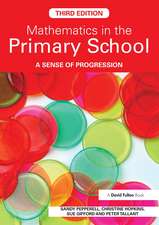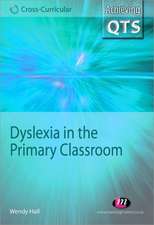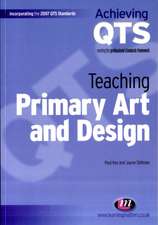Developing Successful K-8 Schools: A Principal's Guide
Editat de Jon W. Wilesen Limba Engleză Paperback – 31 aug 2009
Developing Successful K-8 Schools offers strategies for designing curriculum aligned to state standards, promoting 21st-century skills, planning instruction, and evaluating an effective K-8 programme. Readers will also find:
- Ten proven instructional methods for meeting the learning needs of K-8 students, plus examples that illustrate how to apply the strategies and deal with problems that might arise
- Student assessment techniques and record-keeping procedures
- Implementation tools such as checklists, activity charts, and much more.
This resource is ideal for school leaders who want to articulate a clear vision for a K-8 school and stay on the cutting edge of educational excellence and student achievement.
| Toate formatele și edițiile | Preț | Express |
|---|---|---|
| Paperback (1) | 224.00 lei 43-57 zile | |
| SAGE Publications – 31 aug 2009 | 224.00 lei 43-57 zile | |
| Hardback (1) | 447.05 lei 43-57 zile | |
| SAGE Publications – 27 iul 2009 | 447.05 lei 43-57 zile |
Preț: 224.00 lei
Nou
Puncte Express: 336
Preț estimativ în valută:
42.90€ • 44.20$ • 35.94£
42.90€ • 44.20$ • 35.94£
Carte tipărită la comandă
Livrare economică 24 februarie-10 martie
Preluare comenzi: 021 569.72.76
Specificații
ISBN-13: 9781412966177
ISBN-10: 1412966175
Pagini: 152
Dimensiuni: 178 x 254 x 10 mm
Greutate: 0.32 kg
Ediția:1
Editura: SAGE Publications
Colecția Corwin
Locul publicării:Thousand Oaks, United States
ISBN-10: 1412966175
Pagini: 152
Dimensiuni: 178 x 254 x 10 mm
Greutate: 0.32 kg
Ediția:1
Editura: SAGE Publications
Colecția Corwin
Locul publicării:Thousand Oaks, United States
Recenzii
“This book provides a clear and concise road map for turning the current trend towards K-8 schools to the advantage of children. The return to K-8 schools is an opportunity to step back, be purposeful and thoughtful, and plan for what we want for young persons in our schools. This book provides the vision and the tools we need to plan and build something better in Grades K-8.”
“As a middle school principal, I find many of these arguments compelling. This book makes a major contribution to the field of education. School leaders developing K-8 schools will find this book helpful.”
"A valuable resource for all educators. It not only provides a timeline of past mistakes and successes we’ve made educating students of these ages, but goes further to provide a prescription for future schools that emphasizes developmental levels, content, skill-building, and involvement of students, parents, teachers, and administrators.”
“As a middle school principal, I find many of these arguments compelling. This book makes a major contribution to the field of education. School leaders developing K-8 schools will find this book helpful.”
"A valuable resource for all educators. It not only provides a timeline of past mistakes and successes we’ve made educating students of these ages, but goes further to provide a prescription for future schools that emphasizes developmental levels, content, skill-building, and involvement of students, parents, teachers, and administrators.”
Cuprins
List of Figures
Preface
Acknowledgments
About the Author
1. Here Comes the K-8 School
Origins of the New K-8 School
Rationale for Changing the School Design
Bedrock Beliefs About Educating Children
An Initial Look at the New K-8 Program We Need
Some Issues Associated With K-8 Education
Questions for Study Groups
Summary
Notes
2. Using Standards to Define K-8 Programs
Origin of Standards
National Standards for K-8 Education
Subject Matter Standards in K-8 Schools
Extending Standards in K-8 Schools
Learning Targets for Standards-Based School
Managing Standards-Based Programs
Nurturing Intellectual Competence
Transfer of Knowledge
Questions for Study Groups
Summary
Notes
3. Using Skills to Create the Seamless Curriculum
Two Conceptions of Ends
The Curriculum Design Tasks
What Kind of Skills Should be Taught?
Sample Tasks for Each Learner
Collaborative Emphasis
A Final Word About the Subjects
Questions for Study Groups
Summary
Notes
4. New Instructional Patterns for the K-8 School
General Design
Organization Patterns
Modifying Standards-Based Curriculum
New Uses of School Buildings
New Deployment of Teachers
New Ways of Assessing Students
New Patterns for Involving Parents
Questions for Study Groups
Summary
Notes
5. A Return on Investment
Parents
Students
Teachers
Administrators
Questions for Study Groups
Summary
Notes
6. Implementing the K-8 Program
The Unfolding Process
Prerequisite Conditions
Acquiring Resources
Assessment
Putting It All Together
Questions for Study Groups
Summary
Notes
7. Validating Progress
Concept Development
Mission Statements
Curriculum Design
Instructional Features
Teachers
Parents
Facilities and Transportation
Technology
Resource A. Summary of K-8 Research Findings
Resource B. Standards Organizations
Resource C. Instructional Resource Sites on the Internet
Resource D. Teaching Through the Internet
Resource E. Glossary
References
Index
Preface
Acknowledgments
About the Author
1. Here Comes the K-8 School
Origins of the New K-8 School
Rationale for Changing the School Design
Bedrock Beliefs About Educating Children
An Initial Look at the New K-8 Program We Need
Some Issues Associated With K-8 Education
Questions for Study Groups
Summary
Notes
2. Using Standards to Define K-8 Programs
Origin of Standards
National Standards for K-8 Education
Subject Matter Standards in K-8 Schools
Extending Standards in K-8 Schools
Learning Targets for Standards-Based School
Managing Standards-Based Programs
Nurturing Intellectual Competence
Transfer of Knowledge
Questions for Study Groups
Summary
Notes
3. Using Skills to Create the Seamless Curriculum
Two Conceptions of Ends
The Curriculum Design Tasks
What Kind of Skills Should be Taught?
Sample Tasks for Each Learner
Collaborative Emphasis
A Final Word About the Subjects
Questions for Study Groups
Summary
Notes
4. New Instructional Patterns for the K-8 School
General Design
Organization Patterns
Modifying Standards-Based Curriculum
New Uses of School Buildings
New Deployment of Teachers
New Ways of Assessing Students
New Patterns for Involving Parents
Questions for Study Groups
Summary
Notes
5. A Return on Investment
Parents
Students
Teachers
Administrators
Questions for Study Groups
Summary
Notes
6. Implementing the K-8 Program
The Unfolding Process
Prerequisite Conditions
Acquiring Resources
Assessment
Putting It All Together
Questions for Study Groups
Summary
Notes
7. Validating Progress
Concept Development
Mission Statements
Curriculum Design
Instructional Features
Teachers
Parents
Facilities and Transportation
Technology
Resource A. Summary of K-8 Research Findings
Resource B. Standards Organizations
Resource C. Instructional Resource Sites on the Internet
Resource D. Teaching Through the Internet
Resource E. Glossary
References
Index
Descriere
Offers practical strategies and a step-by-step plan for developing or transitioning to a K–8 school, including methods for curriculum design, student assessment, and more.













